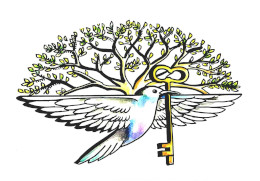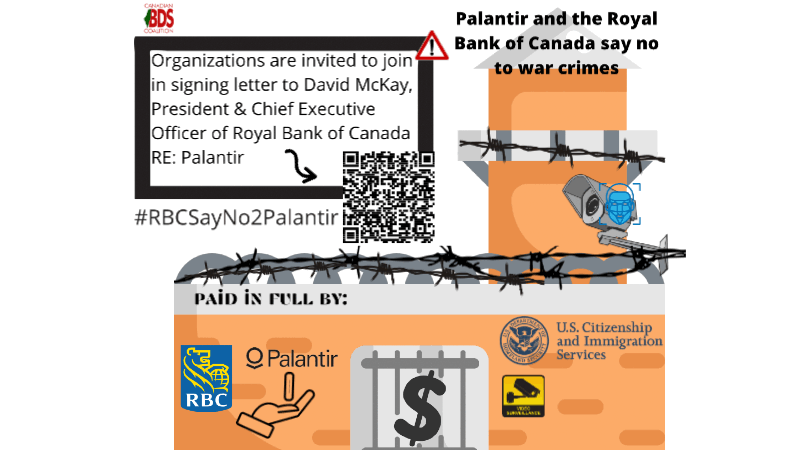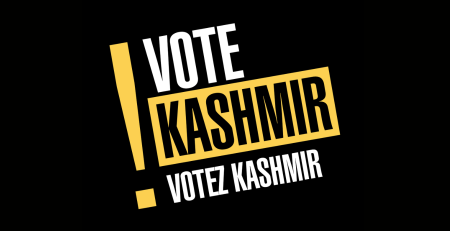Palantir provides their Artificial Intelligence (AI) predictive system to Israeli security forces, to identify people in occupied Palestine.
The Royal Bank of Canada has over 2 M shares valued at over $56 M USD in Palantir holdings. This relationship flies in the face of the recently offered option of a market-linked guaranteed investment certificate based upon environmental, social, and governance investigations which preclude investments in divisive and dangerous elements of society.
Take one minute and write to RBC officials, President McKay, CFO Ahn, Chair Taylor.
Bring RBC relations with Palantir Technologies Inc. (PTI) to their attention.
Palantir provides the same mass surveillance tools to law enforcement agencies and police departments, circumventing warrant procedures giving police access to vast amounts of information about individuals.
The use of law enforcement databases, gathered from the Israeli military, skews the predictive power of the AI analysis to focus upon the types, locations, and Palestinians currently in the database. Human rights organizations deplore this type of policing. In Canada, the way these data bases are constructed makes them unlawful. (Read more below)
In the USA, Palantir has multi-million dollar contracts with Immigration and Customs Enforcement (ICE) that aid in human rights abuses, like family separation and deportations. You can read more about & join this campaign HERE.
Learn more from Investigate, the American Friends Service Committee project about Palantir and its involvement in ICE, police data sharing & predictive policing, military AI, Covid-19 survellance and monitoring, and other controversies, as well as targeting of Palestinians.
As of June 30, 2021, the Royal Bank of Canada (RBC) has 2,139,217 shares of Palantir Technologies Inc Class A (US:PLTR) with total holdings valued at $56,390,000 USD. The RBC holdings in Palantir have been steadily increasing quarter over quarter.
RBC made these investments despite the controversy surrounding the September 2020 direct listing of PTI on the New York Stock Exchange. Palantir was criticized in the financial press for an unusual corporate governance structure.
#RBCsayNo2Palantir
Background
Palantir and the Royal Bank of Canada
The most recent 13F-HR filed on September 24, 2021, discloses that as of June 30, 2021, the Royal Bank of Canada (RBC) has 2,139,217 shares of Palantir Technologies Inc Class A (US:PLTR) with total holdings valued at $56,390,000 USD. This is an increase of 7% shares and 21.26% value over the previous quarter.
On May 17, 2021, Royal Bank of Canada (RBC) filed a 13F-HR form disclosing ownership of 1,996,776 shares of Palantir Technologies Inc. Class A (US:PLTR) with total holdings valued at $46,505,000 USD as of March 31, 2021. RBC previously filed a 13F-HR on February 16, 2021 for December 31, 2020, disclosing 738,566 shares of Palantir Technologies Inc. Class A at a value of $17,392,000 USD. This represents a change in shares of 170.36 percent and a change in value of 167.39 percent during that quarter.
RBC has a history of taking positions in derivatives of the underlying security (PLTR) in the form of stock options. RBC holds 47,500 call options valued at $1,106,000 USD.
RBC made these investments despite the controversy surrounding the September 2020 direct listing of PTI on the New York Stock Exchange. Palantir was criticized in the financial press for an unusual corporate governance structure: the Chairman, CEO, and President can control shareholder vote outcomes indefinitely, even if they own as little as 0.5% of the company’s shares. This structure was described as undemocratic for excluding the investing public from any meaningful oversight of the company they are invested in. Such a structure would likely have been highlighted as a concern in an Environmental, Social, and Governance review resulting in a withholding of investment had the RBC Vision principles been applied.
Palantir Technologies Inc.
Palantir Technologies Inc. (PTI), headquartered in Denver Colorado, is a software company specializing in data analytics for security and surveillance. Palantir opened an office in Ottawa in 2019.
Palantir designs mass surveillance tools for U.S. Immigration and Customs Enforcement (ICE) to conduct mass surveillance on immigrant communities and conduct workplace raids. PTI provided ICE with its Investigative Case Management System (ICM), a data analysis system collecting and organizing information about individuals and their connections from many sources, including license plate readers, law enforcement databases, facial recognition cameras, public records, email providers, employment records, school and medical records, credit card reports, and social media postings. PTI also designed the FALCON Search and Analysis system for Homeland Security Investigations (HSI), ICE’s investigative arm. HSI has used FALCON to facilitate mass workplace raids.
Palantir provides the same mass surveillance tools to law enforcement agencies and police departments, circumventing warrant procedures in giving police access to vast amounts of information about individuals. The company sells predictive policing technology, apparently developed secretly in New Orleans, which purports to identify people more likely to be gang members or to break the law, using artificial intelligence (AI) and circumstantial indications from the databases PTI scours.
PTI provides their Artificial Intelligence (AI) predictive system to Israeli security forces, to identify people in occupied Palestine. The AI database has been constructed from many sources including license plate readers, law enforcement databases, facial recognition cameras, public records, email providers, employment records, school and medical records, credit card reports, bank statements, mental health diagnoses, business partnerships, family relationships, prison visitations, and social media postings.
Criticism of AI by Canadian Privacy Commissioner
In Canada, the RCMP was recently criticized by Privacy Commissioner Daniel Therrien who tabled a report to Parliament after investigating the national police force’s use of software from U.S.-based Clearview AI. Mr. Therrien ruled, by using this third party’s tools, the RCMP violated the section of the Privacy Act specifying no personal information can be collected by a government institution “unless it relates directly to an operating program or activity of the institution.”
“The use of facial recognition technology by the RCMP to search through massive repositories of Canadians who are innocent of any suspicion of crime presents a serious violation of privacy,” Mr. Therrien found. “A government institution cannot collect personal information from a third-party agent if that third party agent collected the information unlawfully.”
PTI collects data from all clients to feed the massive data base upon which facial recognition and AI predictions are based. Similar to the database employed by Clearview AI, there is significant doubt that all the individuals whose picture is resident in the PTI database are voluntarily there. As a result, there is considerable concern for violation of human rights.
Artificial Intelligence is Problematic
AI has two major intrinsic problems: 1.the data base upon which the AI is developed and 2. the ‘world view’ of the developers.
The use of law enforcement databases, gathered from the Israeli military, will skew the predictive power of the AI analysis to focus upon the types, locations, and Palestinians currently in the database. Human rights organizations deplore this type of policing. In Canada, the way these data bases are constructed makes them unlawful.
The integration of the ‘world view’ of the developers of the AI leads to major implications in the application of the models. Princeton computer science professor Olga Russakovsky indicates the bias goes well beyond gender and race. “A.I. researchers are primarily people who are male, who come from certain racial demographics, who grew up in high socioeconomic areas, primarily people without disabilities,” Russakovsky said. “We’re a fairly homogeneous population, so it’s a challenge to think broadly about world issues.”
Russakovsky’s concerns are most applicable to AI in the hands of the Israeli military. Despite a larger component of female participation, the dominance of the Ashkenazi community places considerable bias against Palestinian Arabs, people from comfortable socioeconomic groups against those struggling to survive, and perpetrators of apartheid against those being subjected to apartheid laws.
In summary Palantir is providing services to the Israeli military with questionable regard for human rights as shown by the Israeli military’s disproportionate response to the Great March of Return by residents of Gaza. The PTI artificial intelligence algorithms appear to be questionable.
Royal Bank relationship with Palantir Technologies Inc.
This leads us to ask RBC the following quesitons several times during 2021–questions which they have not yet answered
Why did RBC invest in Palantir Technologies Inc.?
Did RBC conduct an Environmental, Social, and Governance (ESG) analysis of this investment?
If so, was that analysis consistent with the principles of the RBC Vision ESG methodology? If the analysis exists, might we please have a copy? If a copy is unavailable to us, would a copy be provided to an RBC shareholder upon their request?
If RBC did not conduct an ESG analysis, why was one not undertaken?
Is RBC a client of Palantir Technologies Inc.?
Has RBC provided data to form part of the database used by Palantir Technologies Inc.?
Why does RBC provide a line of credit to Palantir Technologies Inc.?
Demand RBC break relations with Palantir.
#RBCsayNo2Palantir
Initiated by
the Canadian BDS Coalition
Organizations endorsing:
Just Peace Advocates
Canadian BDS Coalition
Regina Peace Council
Samidoun Palestinian Prisoner Solidarity Network
Canada Palestine Association
Niagara Movement for Justice in Palestine-Israel (NMJPI), ON Canada
muiz solutions
Oakville Palestinian Rights Association
Palestine House
Hamilton Coalition to Stop the War
Palestinian and Jewish Unity
Socialist Action / Ligue pour l’Action socialiste
Early Childhood Intercultural Partnerships
Anti-Imperialist Alliance
FOSNA (Friends of Sabeel North America)
Socialist Project
Greater Toronto for BDS (GT4BDS)
Academics for Palestine-Concordia
MidIslanders for Justice and Peace in the Middle East
Early Childhood Intercultural Partnerships
Palestine Solidarity Network – Edmonton
Quit RBC / Lâche RBC
HR4A Saskatchewan
Saskatoon Peace Coalition
Pakistan Labour Federation (PLF)
Organizations wish to endorse can do so HERE.






